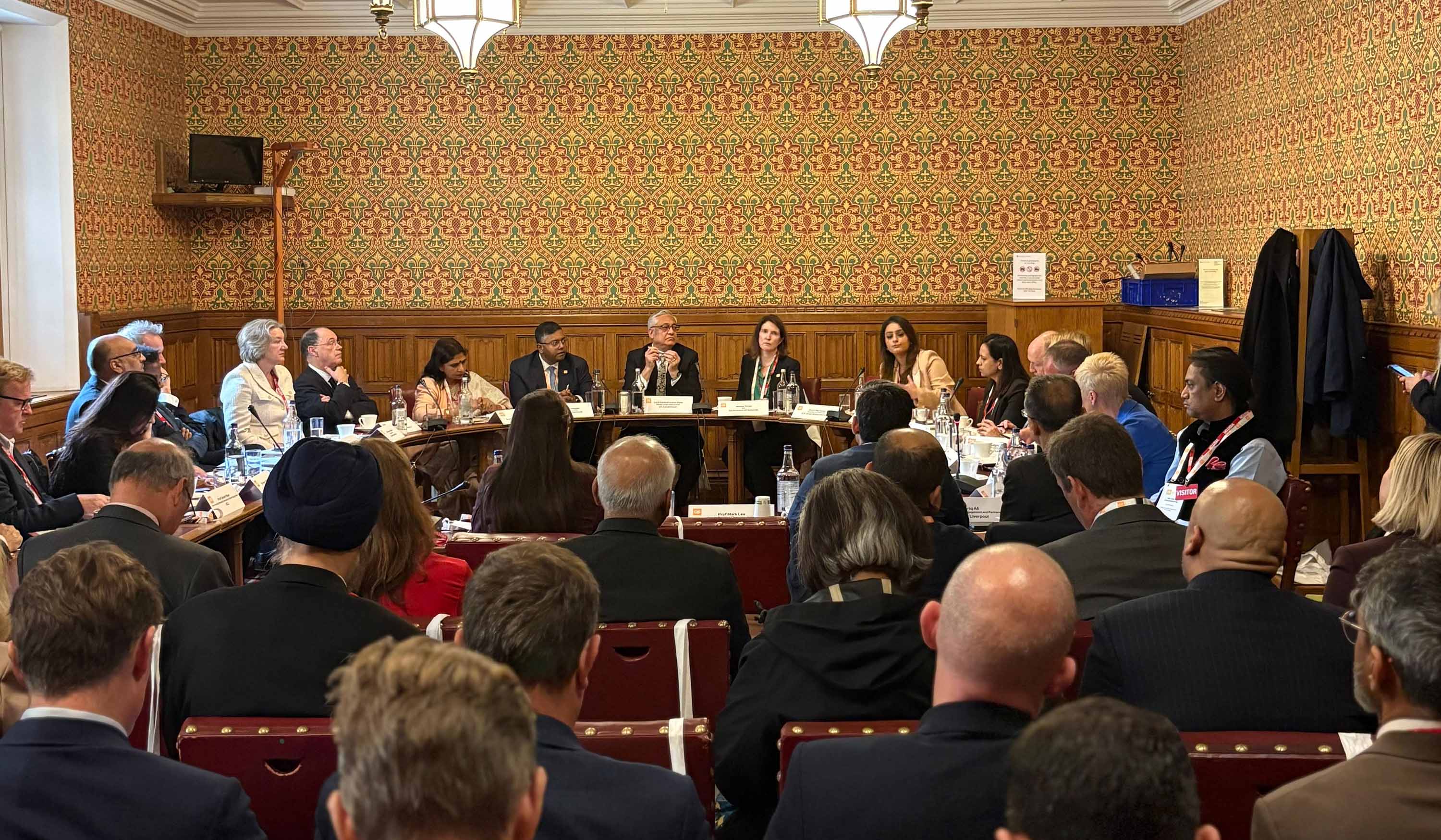Welcome to the New Zealand Spotlight on the QS World Future Skills Index, where we explore higher education’s critical role in shaping the workforce of tomorrow. This tailored resource empowers you to analyse New Zealand’s future skills supply and demand, benchmark key industry jobs and skills gaps against over 80 countries, and align your higher education system with the skills training required for economic transformation.
New Zealand performance overview
New Zealand is building a strong future talent foundation, shaped by high-quality education, a values-driven workforce, and growing capability in sustainability-aligned sectors. With excellent Academic Readiness (94.7) and solid Skills Fit (75.6), the country is well positioned to lead on green and ethical innovation. Future of Work (80.0) performance signals that employer demand for future skills is strong—particularly in sustainability-linked fields. However, Economic Transformation (63.5) lags behind peer OECD countries, driven by low Economic Capacity (32.1) and limited momentum in research commercialisation.
Compared with economies like South Korea, New Zealand faces the challenge of translating academic and workforce strength into larger-scale industrial growth. A key priority will be to activate under-utilised talent through expanded innovation ecosystems, deeper business-academic collaboration, and targeted investment in R&D and infrastructure
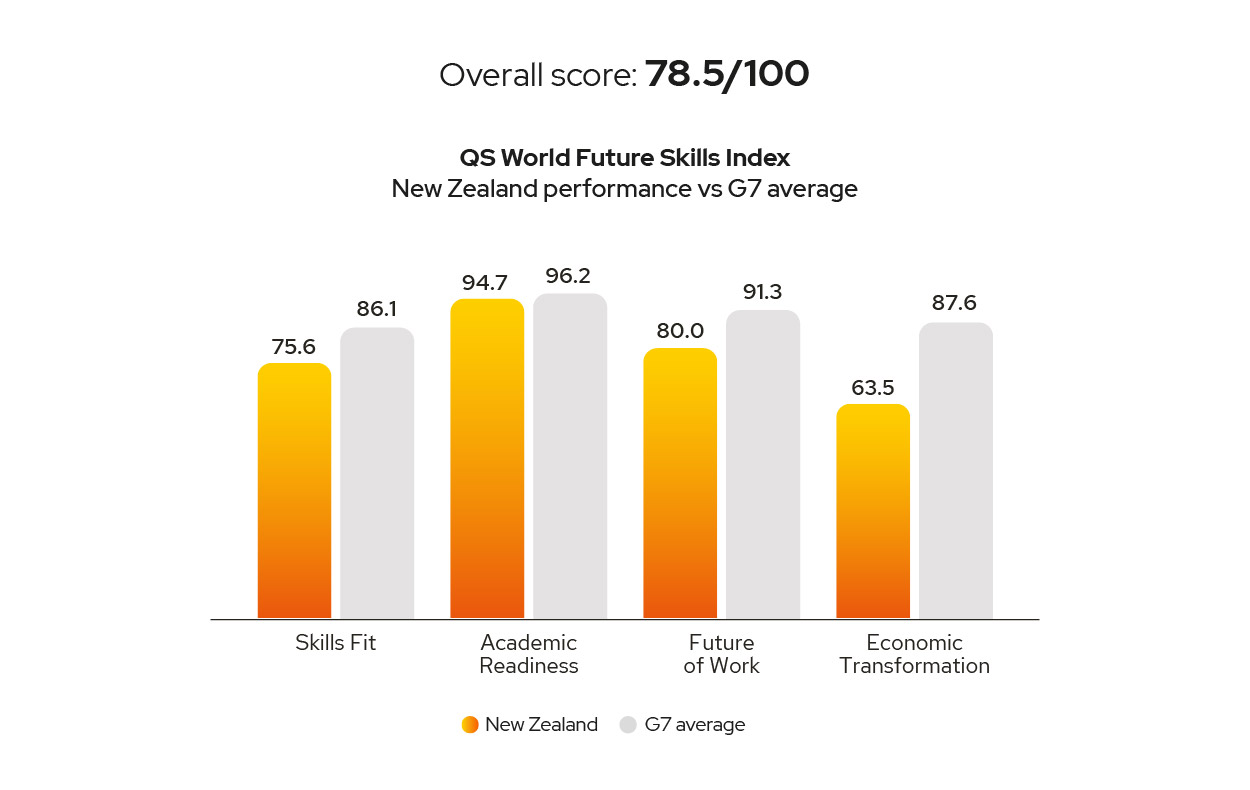
About the indicators
Skills Fit
The Skills Fit indicator measures how well countries are equipping graduates with the skills that employers desire. This is assessed by determining the gap between what employers find important and their level of satisfaction with the skills provided by graduates. This is done using data from the QS Global Employer Survey, the largest of its kind, and data from the World Bank Group. Since 2021, over 100,000 employers have rated the importance of certain skills and their satisfaction in their graduate hires.
Future of Work
The Future of Work indicator evaluates a country’s readiness to recruit for the skills needed in the jobs of tomorrow. Specifically, it measures how well the job market is prepared to meet the growing demand for digital, AI, and green skills, all of which are becoming critical as economies transition towards technology-driven and sustainable industries.
Academic Readiness
This dimension measures how well a country is prepared for the future of work. We look at the number of universities assessed for the QS World University Rankings by Subject, and how they perform. We then measure this in tandem with population size – if a country has a large population but few well-ranked institutions, for example, the country will be penalised.
Economic Transformation
Economic Transformation uses a weighted formula to assess a country’s readiness to support the growth and future of work and skills by examining various key indicators. The Index highlights whether a country has the infrastructure, investment power, and talent available to transition to industries driven by AI, digital transformation, green technologies, and high-skilled work, using data from the World Bank Group, UNESCO Institute for Statistics and the Education Policy Institute
New Zealand performance in detail
Skills Fit
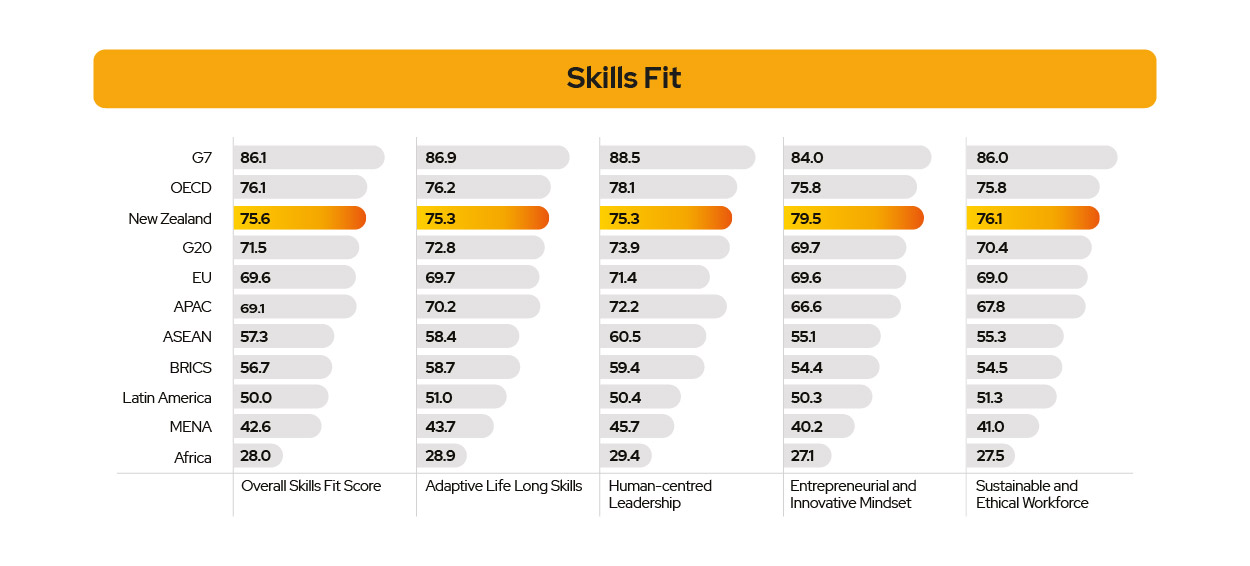
New Zealand’s Skills Fit score reflects a workforce rooted in ethical values and emerging entrepreneurial capabilities. Sustainable and Ethical Workforce (76.1)and Human-centred Leadership (75.3) highlight a people-focused, socially aware talent pipeline. SEntrepreneurial and Innovative Mindset (79.5) is also strong, indicating that graduates are equipped to think critically and drive change. However, compared with peers like Canada (90.9), there is still room to enhance adaptability and applied skills through stronger experiential learning and lifelong upskilling pathways. Embedding cross-sector collaboration and employer-led training into education systems will help ensure these skills translate into scalable innovation and real-world impact.
Future of Work
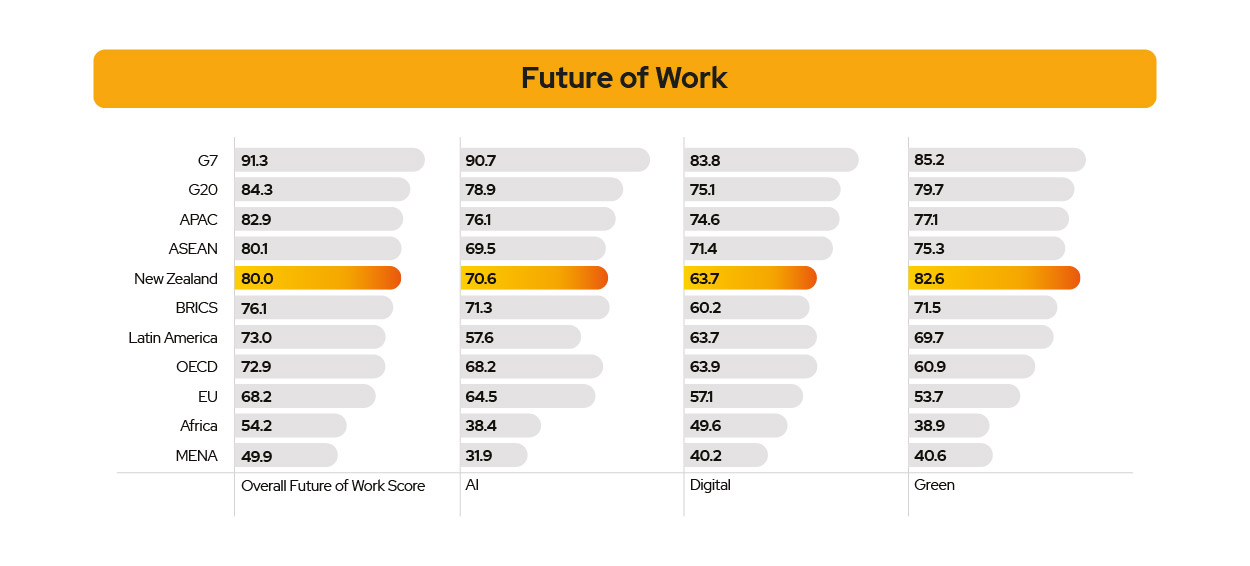
Scoring 80.0, New Zealand’s Future of Work performance suggests that employer demand for the skills of the future is high, but not yet keeping pace with the high calibre of graduates being produced. Compared with economies like Australia (91.0) or Singapore (92.2), there is a mismatch: the supply of future-ready skills exceeds current labour market demand. Addressing this gap will require greater employer awareness and structural incentives to drive digital and green transformation across industries. Expanding work-based learning, co-designed certifications, and SME engagement can help ensure that the country’s skilled graduates access opportunities that that make full use of their capabilities.
Academic Readiness
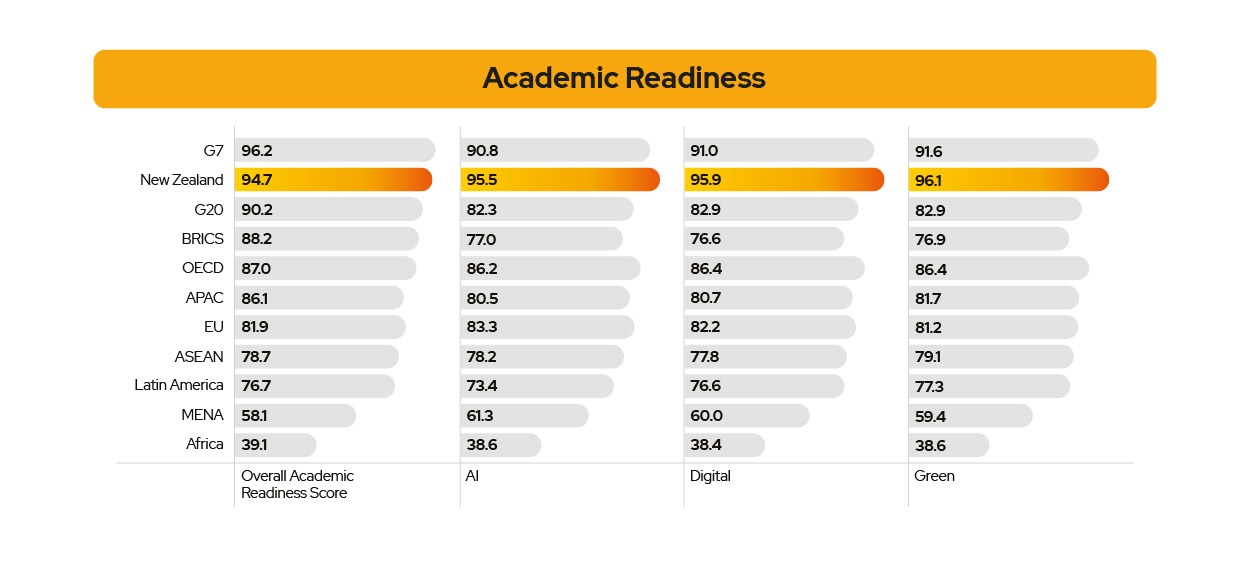
With Academic Readiness at 94.7, New Zealand stands out globally for the quality of its university instruction in AI (95.5), Digital (95.9), and Green (96.1) disciplines. This academic excellence reflects deep integration of future-focused topics into higher education. New Zealand’s institutions also benefit from strong international linkages and alignment with sustainability agendas. However, compared to nations like Singapore or the UK, where research commercialisation and academic-industry collaboration are more fully embedded, there is untapped potential to convert teaching strength into broader economic dividends. Prioritising applied research, expanding entrepreneurial education, and aligning subject strengths with labour market needs will be crucial to bridging this gap.
Economic Transformation
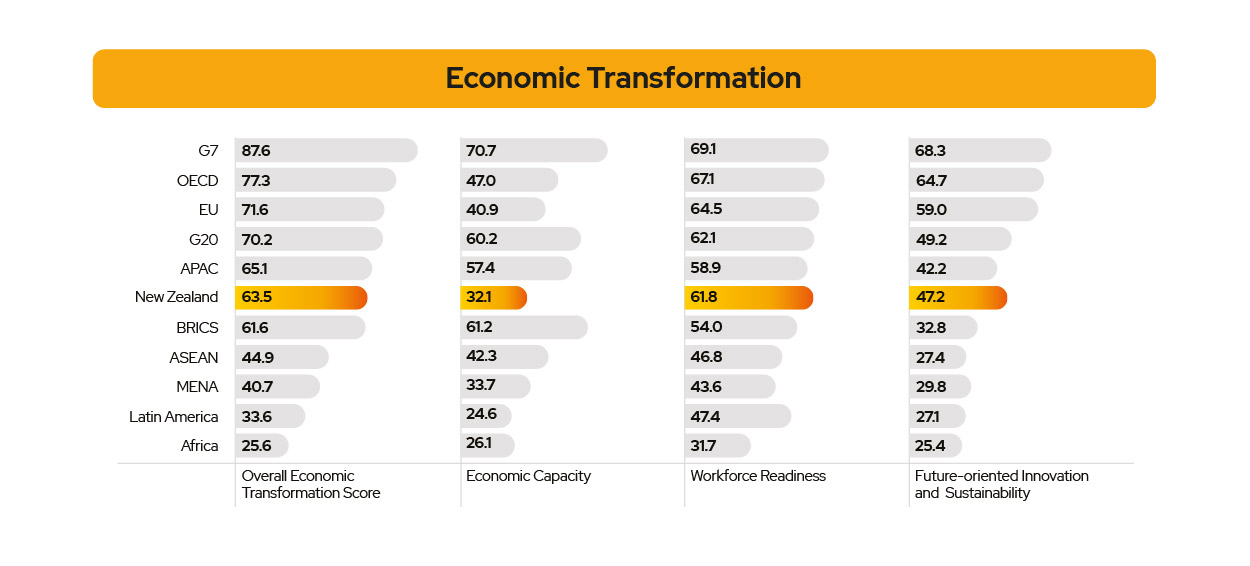
New Zealand’s Economic Transformation score is the lowest of its four indicator scores. Economic Capacity (32.1) is notably low for an advanced economy, suggesting constrained investment, R&D intensity, and industrial scale. Future-Oriented Innovation and Sustainability (47.2) and Workforce Readiness (61.8) reflect a good but not yet fully activated innovation ecosystem. Australia (90.6) is more advanced in converting academic and skills strengths into economic growth. Boosting private sector R&D investment (currently around 1.5% of GDP), incentivising university-led commercialisation, and building cross-sector growth hubs will be vital to lifting New Zealand’s innovation-driven economy.
Conclusion and analysis
New Zealand combines exceptional Academic Readiness (94.7) with good Future of Work alignment (80.0), yet Economic Transformation (63.5) lags behind. The country produces future-ready talent—particularly in Green skills—but must strengthen employer engagement, innovation ecosystems, and R&D investment to turn academic strength into long-term economic impact.
Our analysis and recommendations:
- Expand work-integrated learning and strengthen SME engagement to ensure future-ready graduates—especially in AI and Digital—find meaningful career pathways in high-impact sectors.
- Increase public-private investment in applied R&D and incentivise universities to co-develop solutions with industry.
- Leverage New Zealand’s leadership in Green skills to scale sustainable industries. Align environmental policy, skills development, and job creation to build a competitive green economy.
This tailored resource empowers
The Skills Fit indicator measures how well countries are equipping graduates with the skills that employers desire. This is assessed by determining the gap between what employers find important and their level of satisfaction with the skills provided by graduates. This is done using data from the QS Global Employer Survey, the largest of its kind, and data from the World Bank Group. Since 2021, over 100,000 employers have rated the importance of certain skills and their satisfaction in their graduate hires.
UK’s future skills supply
The Skills Fit indicator measures how well countries are equipping graduates with the skills that employers desire. This is assessed by determining the gap between what employers find important and their level of satisfaction with the skills provided by graduates. This is done using data from the QS Global Employer Survey, the largest of its kind, and data from the World Bank Group. Since 2021, over 100,000 employers have rated the importance of certain skills and their satisfaction in their graduate hires.









.jpg)








